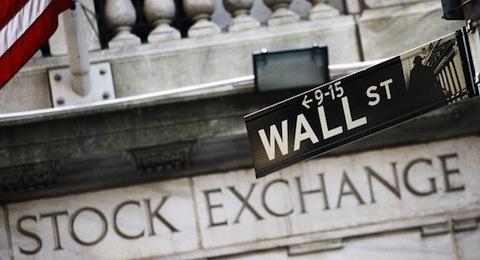Bernie Sanders SLAMS Wall Street in Major Speech That Has Bankers and Hillary Panicking
Bernie Sanders just delivered one of the most explosive speeches of his campaign, unveiling his plan to break up big banks and hold financial executives accountable for the actions that led to the 2008 financial crisis. And he delivered the speech just blocks away from Wall Street, in his opponent’s backyard. The speech came just one day after Hillary Clinton called on Sen. Sanders to support her Wall Street reform plan.
The speech wasn’t covered on any of the corporate-owned media networks (ABC, CBS, NBC, CNN), but the official hashtag for the event, #BreakEmUp, was a top nationwide trend on Twitter. Tens of thousands of Twitter uses participated in the hashtag, livetweeting the best parts of the speech:
Fraud is the business model of Wall St. It is not the exception, it is the rule. – @BernieSanders #BreakEmUp pic.twitter.com/bqsuzZec1s
ICYMI: Here is the powerful section from @BernieSanders on the need for equal justice #BreakEmUp pic.twitter.com/PUdnAhs7lU
— Symone D. Sanders (@SymoneDSanders) January 5, 2016
“huge banks need to stop acting like loan sharks and start acting like responsible lenders.” — @BernieSanders #BreakEmUp
— mike casca (@cascamike) January 5, 2016
Under my administration, Wall Street CEOs will no longer receive a "get out of jail free" card. #BreakEmUp #FeelTheBern
— Labor for Bernie (@LaborForBernie) January 5, 2016
The rising Democratic presidential challenger promised that in his first 100 days as president, he would order his Secretary of the Treasury to make a list of the biggest banks and insurance companies whose failure would have a catastrophic effect on the US economy. And before the end of his first year in the White House, Sanders would break up those financial institutions into smaller companies.
“Secretary Clinton says that Glass-Steagall would not have prevented the financial crisis because shadow banks like AIG and Lehman Brothers, not big commercial banks, were the real culprits. On this issue, Secretary Clinton is wrong,” Sanders said. “Shadow banks did gamble recklessly, but where did that money come from? It came from the federally insured bank deposits of big commercial banks – something that would have been banned under the Glass-Steagall Act.”
During the speech, Sanders pulled no punches when discussing his opponent’s record, taking a direct shot at Hillary Clinton for her remark at the first presidential debate, in which she said her record of accountability for the financial sector included going to Wall Street and telling them to “cut it out.”
Beyond breaking up big banks, Sanders also called for a financial transactions tax on Wall Street trading, saying it would discourage risky gambling on the market and encourage smart investments in the job-creating economy. He reiterated his promise to use the revenue gained from the new tax to fund tuition-free public colleges and universities.
“During the financial crisis, the middle class of this country bailed out Wall Street. Now, it’s Wall Street’s turn to help the middle class,” Sanders said.
Sanders also called for a national law banning usury, citing previous laws that capped interest rates for loans at 15 percent.
“In The Divine Comedy, Dante reserved a special place in the Seventh Circle of Hell for those who charged people usurious interest rates,” Sanders said. “Today, we don’t need the hellfire and the pitch forks, we don’t need the rivers of boiling blood, but we do need a national usury law.”
One of the Vermont senator’s most popular lines of the day was when he promised to file criminal charges against the bankers responsible for the 2008 financial crisis.
We live in a country today that has an economy that is rigged, a campaign finance system which is corrupt and a criminal justice system which, too often, does not dispense justice.
Not one major Wall Street executive has been prosecuted for causing the near collapse of our entire economy.
That will change under my administration. “Equal Justice Under Law” will not just be words engraved on the entrance of the Supreme Court. It will be the standard that applies to Wall Street and all Americans.
But the speech wasn’t all condemnation for big banks. Sanders used the opportunity to propose for postal banks to be allowed to perform basic financial services to serve low-income communities that don’t have access to a bank. Sanders argue that postal banking is needed to prevent Americans from having to pay exorbitant fees and interest rates for cashing checks and getting small loans to pay for car repairs and medical emergencies.
Today, if you live in a low-income community and you need to cash a check or get a loan to pay for a car repair or a medical emergency, where do you go? You go to a payday lender who could charge an interest rate of over 300 percent and trap you into a vicious cycle of debt. That is unacceptable,” Sanders said. “We need to stop payday lenders from ripping off millions of Americans.”
To conclude his speech, Bernie Sanders called for the Federal Reserve to be fundamentally restructured so decisions are made more democratically, and so big banks wouldn’t get to have a say in the governance of the body that’s supposed to be regulating them.
“I think the American people would be shocked to learn that Jamie Dimon, the CEO of JP Morgan Chase, served on the board of the New York Fed at the same time that his bank received a $391 billion bailout from the Federal Reserve,” Sanders told the crowd, who booed. “That is a clear conflict of interest that I would ban as president.”
Click here to read the full details of Sanders’ plan to rein in Wall Street.


Spread the word